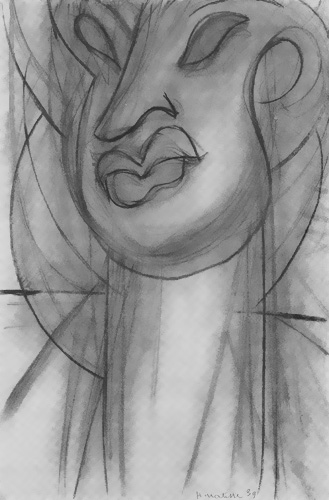The first four episodes of Wake Up, Jack Kerouac’s previously unpublished life of the Buddha, recounted the story of Prince Siddhartha’s early life: leaving his father’s palace, taking up the homeless life, attaining enlightenment, and delaying his own entry into nirvana until all sentient beings are freed from suffering. Episode Five described the Buddha’s journey to Benares, where he gave his first sermon. This installment picks up the story after Shakyamuni has ordained five ascetics as monks and formed the first sangha. The complete manuscript of Wake Up will appear in a volume entitled Some of the Dharma, due to be published by Viking Penguin in 1995. Note: Kerouac’s original spellings and usage have been retained throughout.
Shortly afterwards the Buddha had an accession of a thousand new disciples by the conversion of three leading fire-worshipping ascetics, the Kasyapa brothers with all their followers. It was on the Elephant Rock near Gaya with the beautiful valley of Rajagaha stretched out before them, that Buddha, seizing the occasion of a sudden brush fire on the horizon, delivered his famous great Fire Sermon (Aditta-Pariyaya-Sutra) to the thousand assembled fire-sacrificers who had all of them aforetime been monks with matted hair.
“All things, O priests, are on fire. And what, O priests, are all these things which are on fire?
“The eye, O priests, is on fire; forms are on fire; eye-consciousness is on fire; impressions received by the eye are on fire; and whatever sensation, pleasant or unpleasant, or indifferent, originates in dependence on impressions received by the fire, that also is on fire.
“And with what are these on fire?
“With the fire of passions, say I, with the fire of hatred, with the fire of infatuation; with birth, old age, death, sorrow, lamentation, misery, grief, and despair are they on fire.
“The ear is on fire; sounds are on fire; the nose is on fire, odors are on fire; the tongue is on fire, tastes are on fire; the body is on fire, things touchable are on fire; the brain is on fire, ideas are on fire; mind-consciousness is on fire, impressions received by the mind are on fire; and whatever sensation, pleasant or unpleasant, or indifferent, originates in dependence on impressions received by the mind, that also is on fire.
“Perceiving this, O priests, the learned and noble being conceives an aversion for the eye, an aversion for forms, an aversion for eye-consciousness, an aversion for impressions received by the eye; and whatever sensation, pleasant or unpleasant, or indifferent, originates in dependence on impressions received by the eye, for that also he conceives an aversion. Conceives an aversion for the ear, sounds; the nose, odors; the tongue, tastes; conceives an aversion for the body, things touchable; for the brain, ideas; for mind-consciousness, for the impressions received by the mind; and whatever sensation, pleasant or unpleasant, or indifferent, originates in dependence on impressions received by the mind, for this also he conceives an aversion.
“And in conceiving this aversion, he becomes divested of passion, and by the absence of passion he becomes free.
“And when he is free, he becomes aware that he is free.
“And he knows that rebirth is exhausted, that he has lived the holy life, that he has done what behooved him to do, and that he is no more for this world.
“And that is the reality.”
Thank you for subscribing to Tricycle! As a nonprofit, we depend on readers like you to keep Buddhist teachings and practices widely available.
